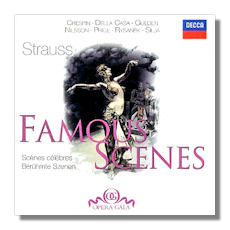
The Internet's Premier Classical Music Source
Related Links
- R. Strauss Reviews
- Latest Reviews
- More Reviews
-
By Composer
-
Collections
DVD & Blu-ray
Books
Concert Reviews
Articles/Interviews
Software
Audio
Search Amazon
Recommended Links
Site News
 CD Review
CD Review
Richard Strauss

Famous Scenes
- Arabella, Op. 79 "Aber der Richtige, wenns einen gibt" 1
- Ariadne auf Naxos, Op. 60 "Es ist alles vergebens… Es gibt ein Reich" 2
- Der Rosenkavalier, Op. 59 "Mein Gott! Es war nicht mehr als eine Farce" 3
- Elektra, Op. 58 "Allein! Weh, ganz allein" 4
- Die Frau ohne Schatten (The Woman without a Shadow), Op. 65 "Sieh- Amme - sieh… Zum Lebenswasser!… Wehe, mein Mann!" 5
- Salome, Op. 54 "Salomes Tanz der sieben Schleier" 6
- Salome, Op. 54 "Es ist kein Laut zu vernehmen" 7
1 Lisa della Casa, soprano
1,3 Hilde Güden, soprano
2 Edita Gruberová, soprano
2 Barry McDaniel, tenor
2 Leontyne Price, soprano
3 Elisabeth Söderström, soprano
3 Heinz Holecek, soprano
3 Régine Crespin, soprano
4 Birgit Nilsson, soprano
5 Leonie Rysanek, soprano
5 Judith Hellwig, soprano
7 Anja Silja, soprano
1,4 Vienna Philharmonic Orchestra/Georg Solti
2 London Philharmonic Orchestra/Georg Solti
3 Vienna Philharmonic Orchestra/Silvio Varviso
5 Vienna Philharmonic Orchestra/Karl Böhm
6 Vienna Philharmonic Orchestra/Herbert von Karajan
7 Vienna Philharmonic Orchestra/Christoph von Dohnányi
Decca 458250-2 ADD 76:29
Here's an idea that hasn't been tried before. Decca has celebrated Richard Strauss's love affair with the soprano voice with a collection of some of his most memorable (and stratospheric) operatic scenes. (The "Dance of the Seven Veils" from Salome, played with showmanship by Karajan and the Vienna Philharmonic, has been included – perhaps needlessly – for contrast.) In other words, don't look for "Di rigori armato" from Der Rosenkavalier, because that aria is sung by a stinking tenor!
These excerpts have been taken from complete recordings. (The exceptions are the aforementioned "Dance of the Seven Veils," and the final scene from Salome.) Some of these recordings are no longer available in the United States; some, I think never were. (I've never seen the Silvio Varviso-led Rosenkavalier with Régine Crespin, Elisabeth Söderström, and Hilde Gueden in this country.) I'm not sure that Anja Silja's shocking Salome finale has appeared on CD, either. Collectors, then, will want this disc for its relative rarities.
There are miles of meltingly lovely singing on this CD. The voices of Lisa della Casa and Hilde Gueden intertwine like roses in the 1957 recording of "Aber der Richtige, wenns einen gibt" scene from Arabella. Crespin, Söderström, and Gueden also make a heart-stopping event out of the Rosenkavalier Act III trio. Of course there is more to being a Straussian soprano than warm fuzzies. When Birgit Nilsson turns her laser-like voice upon Elektra's soliloquy ("Allein! Weh, ganz allein"), the hair rises on the back of one's neck. Rysanek's anguished reading of the Empress's scene from Act II of Die Frau ohne Schatten is another stretch of singing that it is impossible to criticize.
By the time Leontyne Price recorded Ariadne auf Naxos and "Es gibt ein Reich" in 1977, her voice was showing signs of deterioration, particularly in the high notes, but this nevertheless is a memorable moment. Silja's Salome, recorded in 1973, will be a somewhat controversial choice for some, but I welcome it. (An excerpt from Nilsson's recording would have been more obvious.) Even at this date, Silja was not as vocally secure as Nilsson, and the higher she sings, the more the colors bleed out of her voice. Nevertheless, her singing emphasizes that Salome is just a teenager, albeit a disturbed one; Nilsson, for all her glories, is too mature. Christoph von Dohnányi's conducting here is wonderfully brutal.
The excerpts taken from complete recordings required some fade-ins and fade-outs, and Decca's engineers have handled these as unobtrusively as possible. Because the recordings encompass more than twenty years (22 to be exact), the sound quality varies, but it never is less than exciting. And, miracles of miracles, texts and translations have been provided. This is a very worthwhile addition to Decca's "Opera Gala" series.
Copyright © 2001, Raymond Tuttle


















